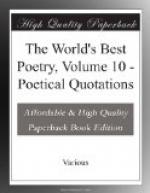The wisest men are glad to die; no
fear
Of death can touch a true philosopher.
Death sets the soul at liberty to fly.
Continuation of Lucan. T. MAY.
Alas! for love, if thou art all,
And naught beyond, O Earth!
The Graves of a Household. MRS. F. HEMANS.
’Tis not the whole of life to live:
Nor all of death to die.
The Issues of Life and Death. J. MONTGOMERY.
Since heaven’s eternal year is thine. Elegy on Mrs. Killegrew. J. DRYDEN.
INCONSTANCY.
Look, as I blow this feather from my face,
And as the air blows it to me again,
Obeying with my wind when I do blow,
And yielding to another when it blows,
Commanded always by the greater gust;
Such is the lightness of you common men.
King Henry VI., Pt. III. Act iii.
Sc. 1. SHAKESPEARE.
Sigh no more, ladies, sigh no more.
Men were deceivers ever;
One foot in sea and one on shore;
To one thing constant never.
Much Ado about Nothing, Act ii. Sc. 3.
SHAKESPEARE.
There is no music in a voice
That is but one, and still
the same;
Inconstancy is but a name
To fright poor lovers from a better choice.
Shepherd’s Holiday. J. RUTTER.
The fraud of men was ever so
Since summer first was leafy.
Much Ado about Nothing, Act ii. Sc. 3.
SHAKESPEARE.
Love
ne’er should die;...
One object lost, another should succeed;
And all our life be love.
Pastorals. T. BROWN.
There are three things a wise man will
not trust:
The wind, the sunshine of an April day,
And woman’s plighted faith.
Madoc. R. SOUTHEY.
Who trusts himself to woman or to waves
Should never hazard what he fears to lose.
Governor of Cyprus. J. OLDMIXON.
Away, away—you’re all
the same,
A flattering, smiling, jilting throng!
O, by my soul, I burn with shame,
To think I’ve been your slave so
long!
Song. T. MOORE.
Frailty, thy name is woman! Hamlet, Act i. Sc. 2. SHAKESPEARE.
HAMLET.—Is this a prologue, or the posy of a ring?
OPHELIA.—’Tis brief, my lord.
HAMLET.—As woman’s love.
Hamlet, Act iii. Sc. 2. SHAKESPEARE.
Framed to make women false.
Othello, Act i. Sc. 3. SHAKESPEARE.
To beguile many, and be beguiled by one. Othello, Act iv. Sc. 1. SHAKESPEAKE.
Or
ere those shoes were old
With which she followed my poor father’s
body,
Like Niobe, all tears;—why
she, even she
(O God! a beast that wants discourse of
reason
Would have mourned longer) married with
my uncle,
My father’s brother.
Hamlet, Act i. Sc. 2. SHAKESPEARE.




